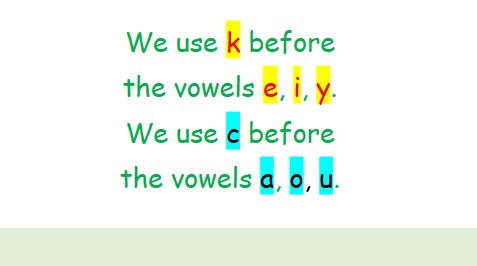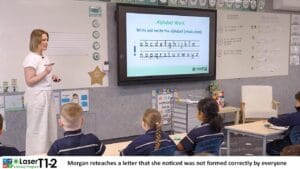
Bill Hansberry
Co-Director Playberry Laser
Some folks argue fairly strongly against teaching spelling rules. They say that this creates cognitive overload for students. I’m assuming their explanation would be that retrieving a spelling rule would create unnecessary cognitive load and use up valuable working memory space that could otherwise be used to retrieve the correct letter string. If that’s the reason, then I’m dubious. Programs that don’t teach spelling rules say that lots of exposure to orthographic letter strings is enough to anchor correct spelling in a learner’s long-term memory. For many students with strong orthographic processing, they’re right! We ‘good spellers’ (a population I’m lucky enough to be part of) have a couple of advantages going for us:
Advantage 1: Strong Phonology
Firstly, we have sharp phonological skills. We have no difficulty mentally lining up speech sounds (phonemes) when we want to spell a word. We don’t muddle the phoneme sequence and get ‘hostipal’ for ‘hospital’ when we put those sounds onto paper as a sequence of letters. Folks with dyslexia often have difficulty at this level of spelling until they’re given targeted training to remediate this difficulty that originates in their language circuits. Phonological awareness training, accompanied by additional and targeted practice that matches letters to sounds, makes a significant difference.
Advantage 2: Strong Orthographic Processing
Secondly, the others and I who find spelling easy are good at storing and retrieving orthographic units (correct letter strings) and the words these letter strings belong to. We can reliably retrieve the ‘aught’ when spelling ‘taught’, the ‘ic’ at the end of ‘frantic’ or the ‘ick’ on ‘brick’. We correctly choose ‘ale’ to spell ‘pale’ and ‘ail’ to complete ‘mail’ (and we also know we’re spelling what comes to the letter box, not a gender).
This ease of storage and retrieval of correct letter strings (orthographic units) isn’t the result of hard work! Despite little study, we were the kids who constantly got 10/10 on weekly spelling tests! We were born with neural circuits that just specialised well for this job when we learned to spell and read! We were lucky! Time to stop looking down our noses at folks who don’t spell as well as we do. We didn’t earn it!
What if you don’t have strong orthographic processing?
So, where does that leave folks who don’t easily store and reliably retrieve the orthographically correct letter sequences that make up the words of our language? What do they do when they want to use a really cool word in a story like ‘frantic’ or ‘panicked’ to describe a high-emotion moment in a story? Do we doom them to safer but less descriptive words like ‘sad’ or ‘worry’ because they’re more likely to be able to spell these and avoid embarrassment?
What if that student, at that moment, can recall:


Whether the student has learned and practised that rule in tier 1 (classroom) instruction or in intervention, the fact is that if the program is a good one, they’ve received a lot of repeated exposure to the spelling rule and plenty of practice applying it across a range of words. It’s not as if it’s been taught once and then been expected to use it (BTW, that’s what can cause cognitive overload).
For this student, even though stopping and retrieving this rule will take them a moment, it does give them a chance to use this higher-level vocabulary word in their story instead of jumping to safe bets like ‘sad’ or having to grammatically restructure the sentence so they can use ‘worry’ instead of ‘worried’ (there’s more cognitive overload).
By the way, there’s also a spelling rule that teaches students how to add -ed to ‘worry’ as well!
Philomena Ott, a giant in this space, tells us, quite correctly, that “Learning rules is not an infallible way to teach spelling”. She’s right. Being able to recite a rule doesn’t even come close to guaranteeing a student will then spell every word that a rule applies flawlessly, forever. “But [a spelling rule] puts down markers, charts, unknown territory and can prevent the dyslexic child from floundering in the quagmire of English spelling.”
(How to Detect and Manage Dyslexia by Philomena Ott)
Now, Philomena Ott is specifically referring to students with dyslexia. However, students with dyslexia or spelling difficulties that are dyslexia-like make up a large percentage of the population—some say up to twenty per cent. Even if these students’ phonological difficulties are remediated, their orthographic difficulties persist due to their difficulty with storing and retrieving the correct letter strings of our complicated spelling system.
I’ve not found one shred of evidence to suggest that teaching spelling rules to already strong spellers holds them back in any way. In fact, knowledge of the most important rules that govern English orthography sparks much interest in more capable spellers and encourages more risk-taking when spelling. I suspect the ‘spelling rules create cognitive overload’ argument indicates a lack of understanding of orthographic processing difficulties and cognitive load theory.
When English spelling was standardised, around the time of the writing of the first dictionary by Samuel Johnson, rules were decided upon to govern the spelling of English words.
Why on earth, then, would we withhold spelling rules from students – any students?






